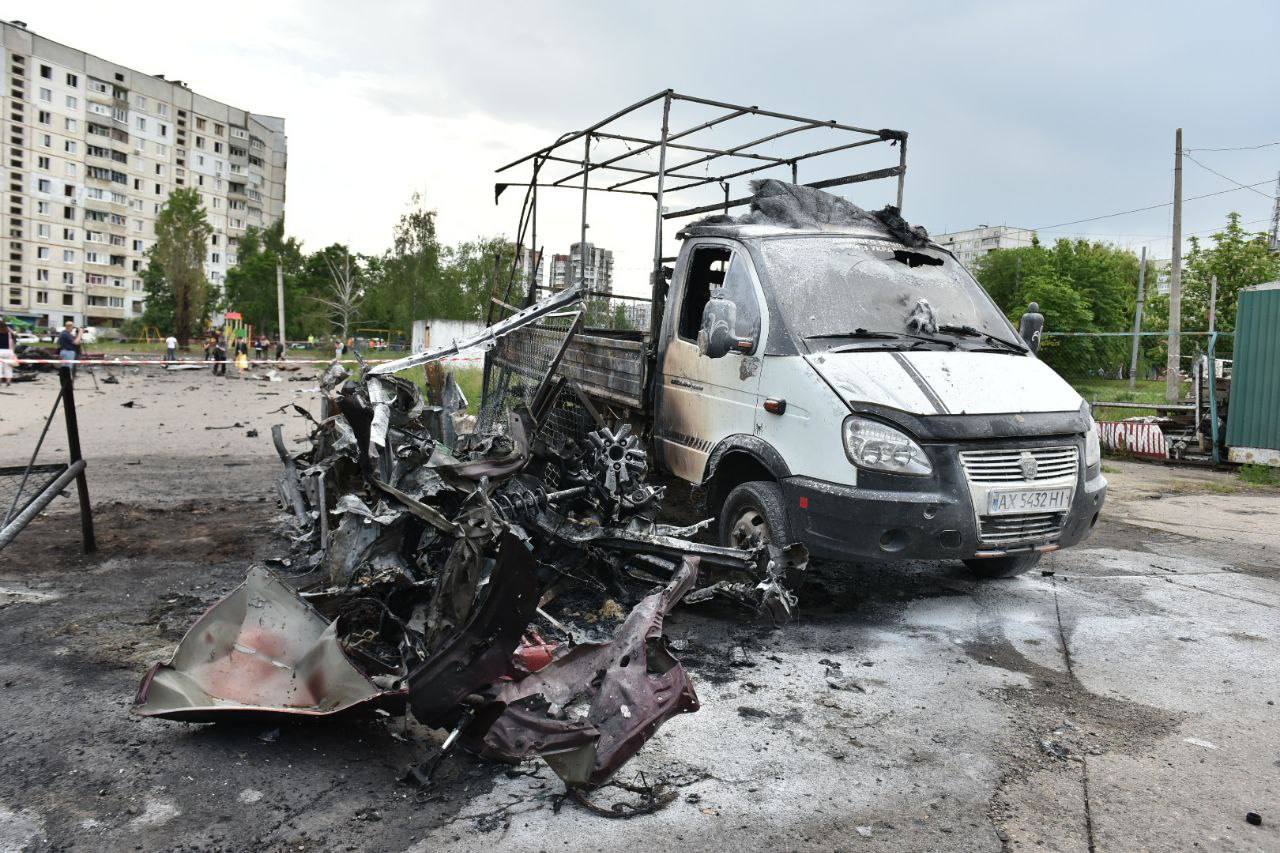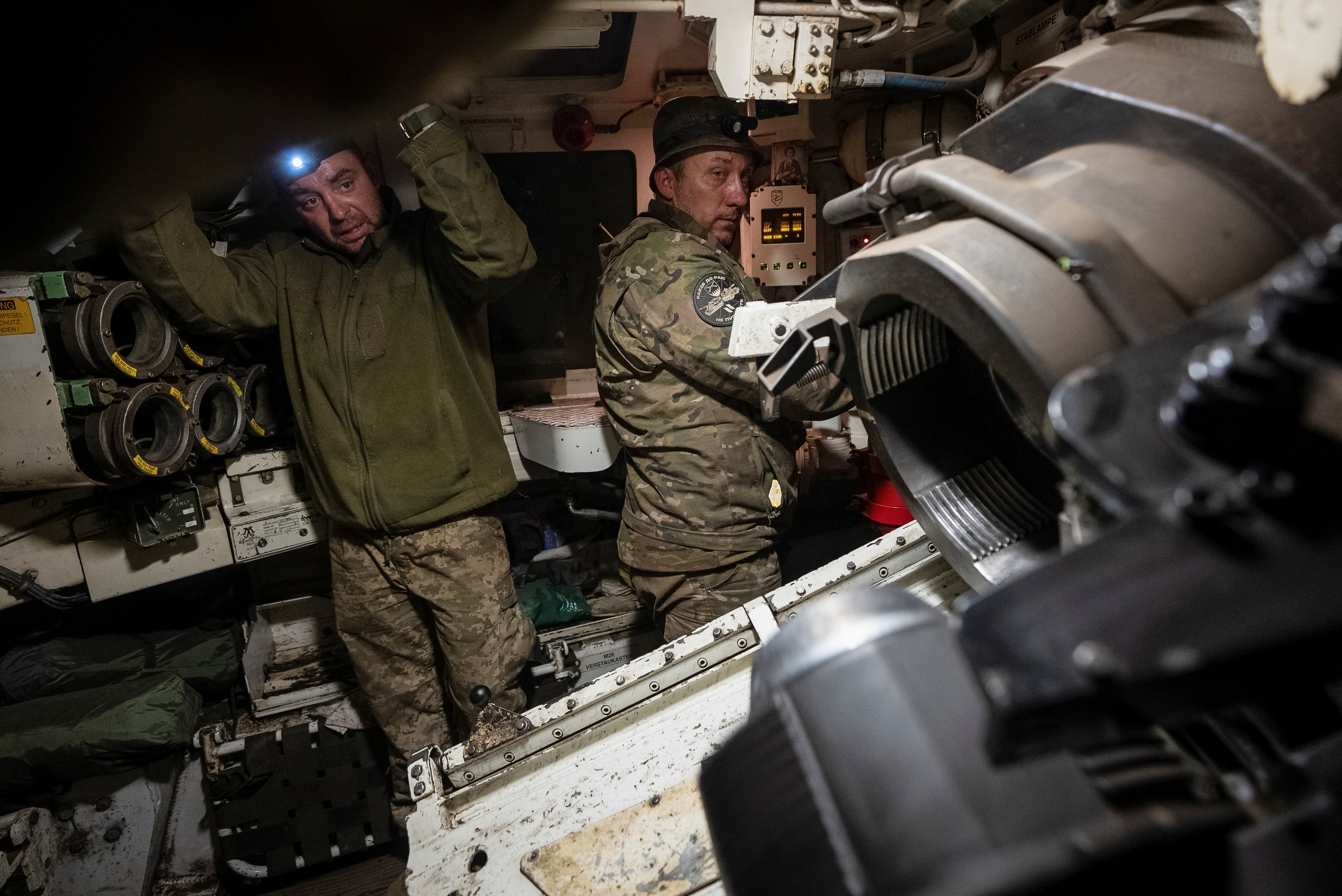At least 10 injured in Russian glide bomb attack on city of Kharkiv
Russian glide bombs - nicknamed ‘building destroyers’ - have left Ukrainian civilians unable to seek out safety in undergound shelters

A Russian airstrike using deadly glide bombs has destroyed a cafe, set a petrol station ablaze and left 10 civilians injured in Ukraine’s northeast region of Kharkiv.
The attack, which left one bus driver close to the explosion without both his legs, is the latest in Russia’s assault in the region after Vladimir Putin’s forces opened up a second front nearly two weeks ago.
“I’ve been left with nothing,” the cafe owner Vahe Ohandzhanian said after the strike, as he stood amid the ruins of the building.
A 12-storey high rise across the road had nearly all its windows blown out, while a green trolleybus in which the driver who lost his legs had been sitting also suffered significant damage.
Regional prosecutors said Russia had used a UMPB D-30 guided bomb launched from the bordering Belgorod region to carry out the attack.
“Ten injured civilians, four were hospitalised, one of the men is in serious condition,” the Kharkiv region’s governor Oleh Syniehubov wrote on Telegram. He posted pictures showing the destroyed cafe and the bloodied side of the green trolleybus.
Kharkiv, Ukraine’s second largest city, and the surrounding region have been targeted by Russian attacks since the start of the full-scale war in 2022.
But aid workers stationed in the region say the situation has become more “tense” in the six weeks or so since Russia has started using glide bombs.
These explosives, some of which weigh more than a tonne, are old bombs that have been modified with “wings” and GPS systems so that they can be dropped by fighter jets from afar, out of range of Ukrainian anti-air defences, and glide towards their target.
What they lack in accuracy, they make up for with destruction.


“If a glide bomb hits, you’ve just got no hope,” says Ada Wordsworth, a young Brit who runs a humanitarian aid charity in Kharkiv. “The destruction is so massive.
“There’s not much point in going into a shelter because if a glide bomb hits, the crater will be deeper than the shelter. It’s a very weird form of a psychological torture that [the Russians] are instilling.”
Strikes have become far more intense in recent months, hitting civilian and energy infrastructure, as Russian forces have opened their new front north of the regional capital, home to some 1.3 million civilians.
Soldiers of Ukraine’s elite 92nd Separate Assault Brigade have been sent to reinforce the positions near Vovchansk, a town around 35 miles from Kharkiv city that has become a key primary defence for Ukraine in the eastward assault of Russia’s multi-pronged attack on the region.
They say the fighting is constant and that they are trying “to inflict maximum casualties” on the advancing Russians.
“We see them walking on foot to their positions. As they move, we of course try to hit them, to inflict maximum casualties," said Vitalii, commander of the brigade’s artillery unit, referring to a town on the Russian side of the border.
Further north, in the neighbouring Sumy region, a Russian attack on the area’s energy facilities knocked out the power for more than half a million residents, according to the energy ministry.
The attack also impacted power supplies to consumers in the neighbouring Chernihiv and Kharkiv regions, but they have since been restored, according to the ministry.
The mayor of the city of Kharkiv told The Independent he believes that delayed US military aid is to blame for the Russian advance and their concurrent aerial onslaught. The $61 billion (£48bn) package was blocked for six months by Donald Trump supporting Republicans. After being passed last month, the aid has been slowly arriving, but not early enough to stop the advance.
Sweden became the latest of Ukraine’s allies to step up to offer more support, announcing a 75 billion crowns (£5.5bn) military package to Kyiv on Wednesday.
The pledge means they have committed €9.195bn in military aid to Ukraine, which is more than all of Ukraine’s allies excluding the US and Germany. The UK has pledged a little over £4.4bn.
Ukrainian President Volodymyr Zelensky said the decision “demonstrates Sweden’s practical solidarity with Ukraine in our struggle for freedom”.
But the aid is scheduled to arrive in tranches over a three-year period, meaning the Ukrainian forces defending on the front, as well as the civilians in need of air defences, will still be left wanting in the short-term.
Join our commenting forum
Join thought-provoking conversations, follow other Independent readers and see their replies
Comments
Bookmark popover
Removed from bookmarks